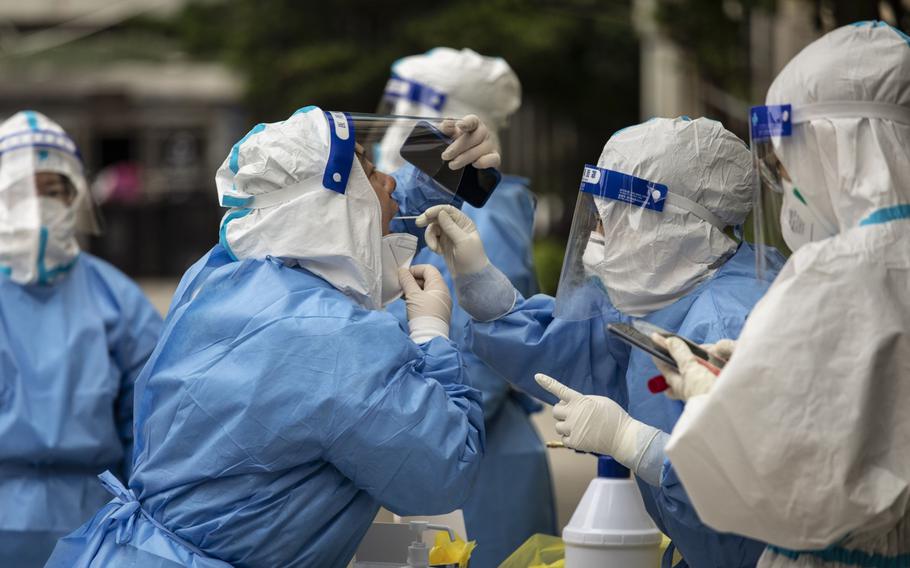
A team of health workers and volunteers in personal protective equipment (PPE) test each other before testing residents at a neighborhood where a suspected flare up in COVID-19 cases occurred in Shanghai on May 9, 2022. (Qilai Shen/Bloomberg)
Premier Li Keqiang's warning of China's "complicated and grave" employment situation on Saturday was particularly dire, even for someone who has sounded the alarm for months. But it was also notable another reason: It didn't mention President Xi Jinping's COVID Zero strategy.
Just days earlier, the Politburo Standing Committee — on which both Xi and Li sit — warned China's citizens not to question COVID-control policies that have locked down cities across the country, including Shanghai. That statement, by contrast, contained no mention of the economy.
Besides confusing local officials who must find a way to eliminate COVID and grow the economy, the mixed messages from China's most powerful leaders raise questions about whether there's a split at the top over the best way out of the pandemic.
Any space between Xi and Li is closely scrutinized for signs of power struggles unfolding in China's opaque government. Once considered rivals for the top job, the pair continue to be seen as standard-bearers for separate strains in policy making, with Xi representing the more ideological wing and Li associated with more technocratic tradition.
"It is probably a stretch to say that Xi and Li are personally at loggerheads, but their statements do represent divergent views within the system on COVID and its impact," said Richard McGregor, author of the "The Party: The Secret World of China's Communist Rulers." "China is reaching the point where the need for a genuine debate about whether the price being paid for further lockdowns is worth the economic damage."
With much of the world seeking to return to normal as vaccines proliferate and virus deaths recede, China is pressing ahead with COVID Zero, increasingly equating dissent against the policy with subverting Xi. Beijing has trumpeted the government's success in stopping outbreaks before they get out of hand as evidence of how China's model of governance is superior to U.S.- or European-style democracy.
Still, the lockdown-dependent strategy has resulted in sustained social tensions in the country's largest city, Shanghai, where many of its 25 million people have been under restrictions for more than a month. Curbs in the capital Beijing have become progressively tighter in recent days.
While the Standing Committee last week made no mention of balancing COVID controls with economic growth, Li's statement emphasized unemployment, which climbed to 5.8% in March, the highest since May 2020. "Stabilizing employment matters to people's livelihoods" Li said, adding that doing so was "also a key support for the economy to operate within a reasonable range."
Joblessness is a topic Li raises regularly, including in remarks at the National People's Congress in March when he announced he wouldn't return as premier next year after a party reshuffle that will likely extend Xi's rule. China's economy will see 16 million new urban job seekers in 2022, and ensuring their employment will require greater policy support, Li said.
Andy Chen, a senior analyst with Beijing-based consultancy Trivium China, said the country's leaders don't see the policy priorities to be at odds. Li, as premier and head of the government, is supposed to focus on the economy, as opposed to Xi, who runs the party and therefore serves as its political leader.
"They see getting the COVID outbreaks under control as the precondition and basis for maintaining a strong economic momentum," Chen said. "So emphasizing on ensuring employment doesn't mean pandemic control is less of a priority. It's still the No. 1 priority."
Whether China's top leaders see their instructions as contradictory, they're creating dilemmas for local officials, who might find COVID controls as literal barriers to keeping supply chains running smoothly. After the Standing Committee's latest decree, "local governments lack a real incentive to dismantle roadblocks" installed on highways to prevent COVID from spreading, Trivium said in its newsletter.
Besides holding different portfolios, Xi and Li hail from separate corners of the party elite. The president is the "princeling" son of a revolutionary while the premier is a trained economist and seen as a protege of former President Hu Jintao. Xi was chosen over Li in 2007 as Hu's successor. Potential successors for Li's job include Li Qiang, a former Xi secretary who's now in charge of the Shanghai lockdown effort.
Li Keqiang "has always represented a strain of more technocratic policy-making in the system that today is very frustrated with how the commitment to COVID Zero has played out," said Jordan Schneider, a senior analyst at Rhodium Group. "Li in his statement was trying to make room for cadres to take into consideration economic, as well as public health, considerations."
Schneider said there's been a pattern of reactive messaging in recent months in which technocratic officials have been called on to give statements that reassure markets only for policies to fall short of expectations. "What may be going on is less a disagreement between the two and more that dovish policy messaging isn't followed up with dovish policy," he said.
A similar split emerged last year after efforts by local officials to meet Xi's ambitious carbon goals were blamed for power shortages. Li later indicated the government would rethink the pace of China's energy transition, slamming a "one-size-fits-all" approach in shutting down energy-intensive projects or "campaign-style" carbon reduction.
McGregor, the author of "The Party" who's now a senior fellow for East Asia at the Lowy Institute in Sydney, said Xi was trying to dictate the outcome of the debate over COVID policy by suppressing one side of the argument. He suggested watching to see if Li becomes more vocal on policy issues as he prepares to leave the premier's job.
"The key question is whether Li persists in speaking up in public about the economy," McGregor said. "Then, we might have the real makings of a split."